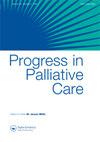COVID-19期间初级保健对高级护理计划的参与和态度:一项针对老年人的横断面调查
IF 0.8
Q4 PUBLIC, ENVIRONMENTAL & OCCUPATIONAL HEALTH
引用次数: 0
摘要
提前护理计划(acp)增加了以患者为中心的护理,减少了护理人员的负担和医疗保健成本。然而,50岁以上的加拿大人中只有25%完成了ACP。对2021年4月在SK里贾纳参加以初级保健诊所为基础的COVID-19疫苗接种活动的年龄≥70岁的人进行了匿名横断面调查。该调查包括有关人口统计、态度、根据变革阶段模型参与ACP的问题,以及患者报告的COVID-19对ACP思想或行动的影响。共完成问卷调查134份,回复率96%。27%的受访者处于“预考虑”阶段,21%的受访者处于“考虑”阶段,16%的受访者处于“计划”阶段,26%的受访者处于“行动”阶段,10%的受访者处于“维护”阶段。33%的受访者在大流行期间更多地考虑了acp,但很少有人更新或制定计划。大多数受访者觉得与他们的医生和伴侣交谈很舒服。医生有必要与患者进行ACP对话。本文章由计算机程序翻译,如有差异,请以英文原文为准。
Engagement and attitudes towards advanced care planning in primary care during COVID-19: A cross-sectional survey of older adults
Advance care plans (ACPs) increase patient-centered care, reduce caregiver burden and healthcare costs. However, only about 25% of Canadians over 50 years of age have completed an ACP. An anonymous, cross-sectional survey was distributed to those ≥70 years attending a primary care clinic-based COVID-19 vaccination event in Regina, SK in April 2021. The survey included questions about demographics, attitudes, engagement in ACPs according to the Stage of Change model, and patient-reported influence of COVID-19 on ACP thoughts or actions. One hundred thirty-four surveys were completed (96% response rate). Twenty-seven percent of respondents were at the precontemplation stage, 21% at contemplation stage, 16% at planning stage, 26% at action stage, and 10% at maintenance stage. Thirty-three percent of respondents had thought more about ACPs during the pandemic, but few updated or created plans. Most respondents felt comfortable talking with their physician and partners. There is a need for physicians to initiate ACP conversations with patients.
求助全文
通过发布文献求助,成功后即可免费获取论文全文。
去求助
来源期刊

PROGRESS IN PALLIATIVE CARE
PUBLIC, ENVIRONMENTAL & OCCUPATIONAL HEALTH-
CiteScore
2.60
自引率
11.80%
发文量
24
期刊介绍:
Progress in Palliative Care is a peer reviewed, multidisciplinary journal with an international perspective. It provides a central point of reference for all members of the palliative care community: medical consultants, nurses, hospital support teams, home care teams, hospice directors and administrators, pain centre staff, social workers, chaplains, counsellors, information staff, paramedical staff and self-help groups. The emphasis of the journal is on the rapid exchange of information amongst those working in palliative care. Progress in Palliative Care embraces all aspects of the management of the problems of end-stage disease.
 求助内容:
求助内容: 应助结果提醒方式:
应助结果提醒方式:


